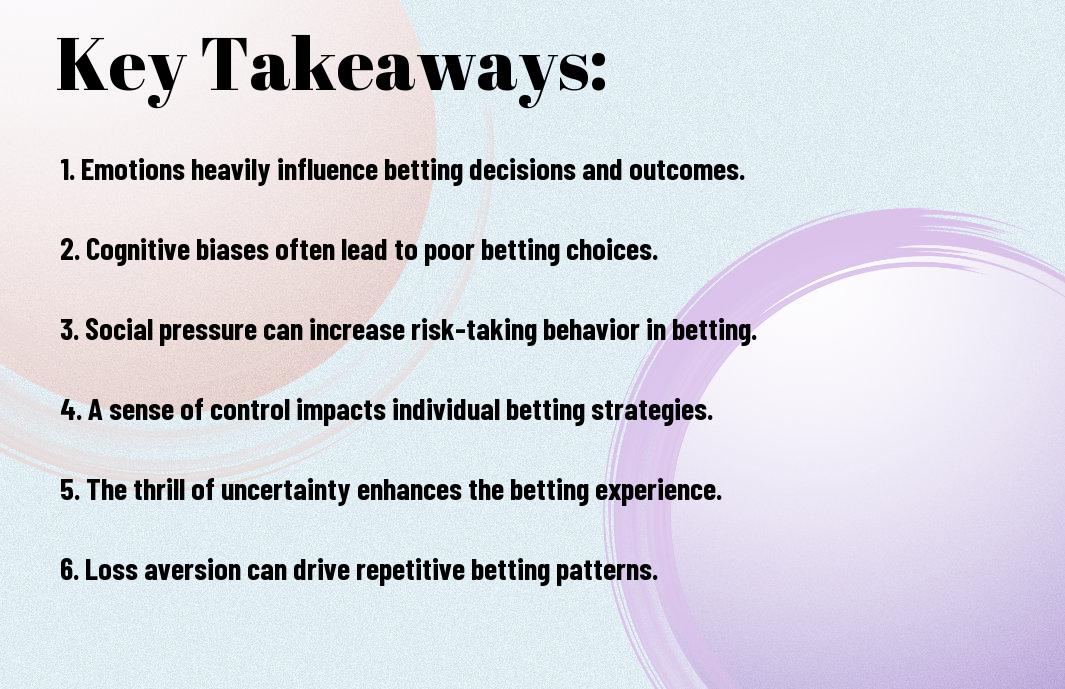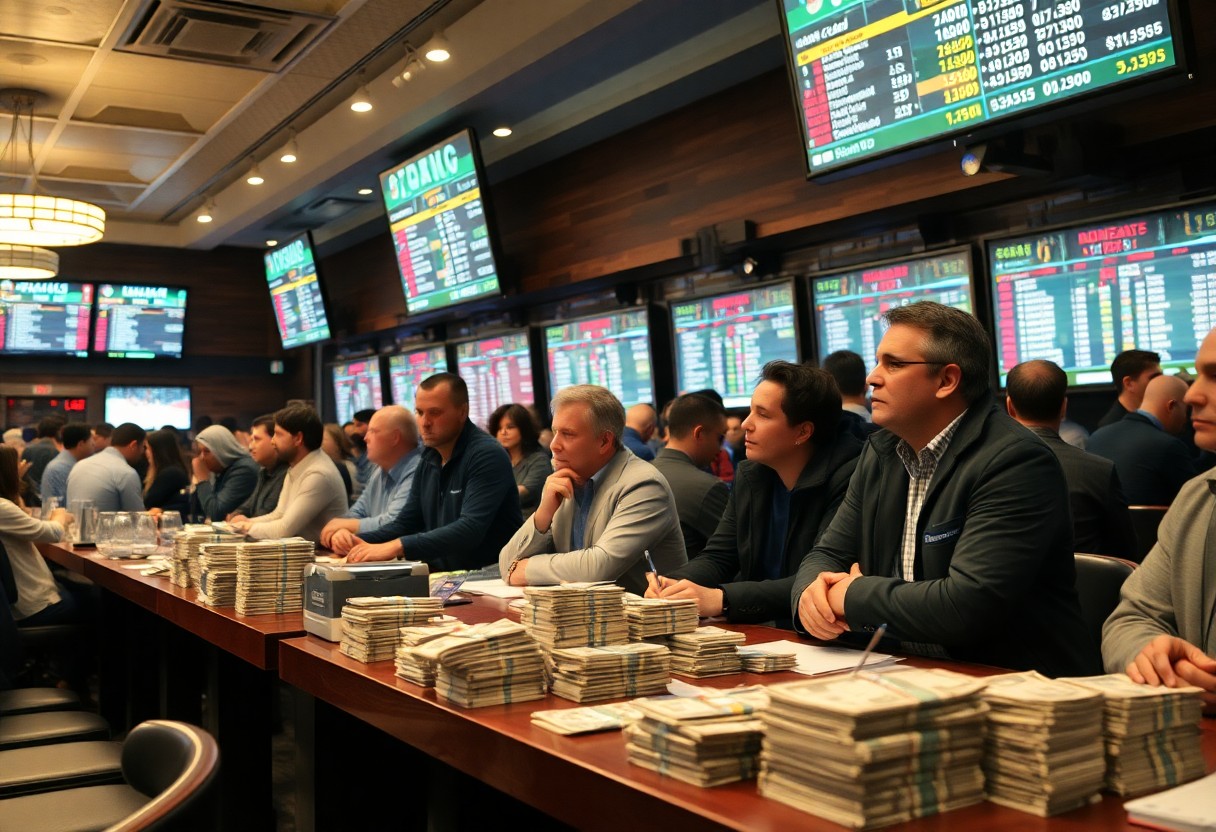As you explore the world of betting, you may wonder what drives your decisions and behaviors. Your actions, in this context, are influenced by a complex array of psychological factors. You will discover how your emotions, cognitive biases, and social interactions shape your betting habits. By understanding these dynamics, you can gain insight into your own behavior and make more informed decisions, ultimately enhancing your betting experience. Your journey to understanding the psychology behind betting begins here.
Key Takeaways:
- Emotions play a significant role in betting decisions, with feelings such as excitement, anxiety, and greed influencing the likelihood of placing a bet and the amount wagered.
- Cognitive biases, such as confirmation bias and the gambler’s fallacy, can lead to irrational betting decisions and impact overall betting strategy.
- The concept of loss aversion can affect betting behavior, as individuals tend to fear losses more than they value gains, leading to risk-averse decision-making.
- Social influence and peer pressure can also impact betting behavior, with individuals often being swayed by the opinions and actions of others in their social circle.
- Understanding the psychological factors that drive betting behavior can help individuals develop more effective betting strategies and make more informed decisions, ultimately leading to better outcomes and a more enjoyable betting experience.

Cognitive Biases in Betting Behavior
For a deeper understanding of your betting behavior, it’s important to explore the cognitive biases that influence your decisions. These biases can lead to irrational choices, affecting your overall betting experience.
Loss Aversion Patterns
On observing your betting habits, you may notice that you tend to fear losses more than you value gains, leading to risk-averse decisions that impact your betting strategy.
Overconfidence Effect
One common bias you may exhibit is the overconfidence effect, where you overestimate your ability to predict outcomes, leading to impulsive bets that can negatively impact your finances.
Aversion to uncertainty can drive you to make bold bets, but the overconfidence effect can lead to a false sense of security, causing you to overlook potential risks and make poor decisions, ultimately affecting your betting performance and overall experience.

Risk Assessment Mechanisms
Some of the most significant factors influencing your betting decisions are related to risk assessment mechanisms, which play a vital role in shaping your behavior as a bettor, helping you evaluate potential outcomes and make informed decisions.
Probability Perception
The way you perceive probability affects your risk assessment, as your brain processes information and makes decisions based on your understanding of likelihood and chance, influencing the bets you place and the risks you take.
Reward Processing
For instance, when you win a bet, your brain processes the reward, releasing dopamine and reinforcing the behavior, which can impact your future betting decisions and risk tolerance, as you become more inclined to seek similar rewards.
Perception of potential rewards significantly influences your betting behavior, as you weigh the potential gains against the risks, and your brain’s reward processing system drives your decision-making, often leading you to pursue bets with higher potential payouts, even if they come with greater risks, in order to experience the thrill of winning and the satisfaction of a big payoff.
Social Influences on Betting Decisions
Now, as you consider the factors that influence your betting decisions, it’s vital to examine the role of social influences, which can significantly impact your behavior.
Peer Pressure Dynamics
With the presence of others, you may feel compelled to make betting decisions based on their opinions or actions, rather than your own judgment, highlighting the powerful effect of peer pressure on your choices.
Cultural Impact Factors
Culturally, the norms and values of your social group can shape your betting habits, and you may be influenced by:
- Social norms around betting and risk-taking
- Cultural attitudes towards winning and losing
After considering these factors, you can better understand how your cultural background affects your betting decisions.
But as you research deeper into the cultural impact factors, you’ll find that your betting behavior is also influenced by:
- Traditional practices and customs
- Community expectations and values
After analyzing these aspects, you’ll be able to make more informed decisions about your betting habits and how they relate to your cultural identity.
Emotional Drivers
Not surprisingly, emotions play a significant role in your betting behavior, influencing the decisions you make and the risks you take.
Anticipation and Dopamine Response
Dynamically, dopamine release is triggered by the anticipation of a potential win, driving your enthusiasm and engagement in betting activities.
Post-Betting Psychological States
Between the thrill of winning and the agony of losing, your emotional state can fluctuate significantly, impacting your subsequent betting decisions and overall experience.
Anticipation of the outcome can leave you in a state of suspense, and once the result is known, you may experience a range of emotions, from euphoria to despair, depending on the outcome, which can affect your self-perception and influence your future betting behavior, making it necessary to understand and manage your emotions to make informed decisions.
Decision-Making Frameworks
All your betting decisions are influenced by various psychological factors. You make choices based on your thoughts, feelings, and past experiences. Understanding these factors can help you improve your decision-making skills and make more informed bets.
Rational Choice Theory
Along with other theories, rational choice theory suggests that you make decisions based on logical evaluations of potential outcomes. You weigh the pros and cons, considering the likelihood of winning or losing, and make a choice that maximizes your expected gain.
Impulse Control Systems
One key aspect of your decision-making process is the impulse control system, which helps you regulate your emotions and impulses. You use this system to control your betting behavior, avoiding impulsive decisions that might lead to negative consequences.
To further understand impulse control systems, you should consider how they interact with your emotional state. When you’re in a heightened emotional state, your impulse control systems may be weakened, leading to impulsive decisions. By being aware of your emotional state and taking steps to manage it, you can improve your ability to control your impulses and make more rational betting decisions.
Prevention and Control Strategies
Your ability to manage betting habits is key to preventing problematic behavior, and understanding your motivations and emotions can help you develop effective strategies to control your actions.
Self-Regulation Methods
Besides seeking support, you can employ self-regulation methods, such as setting limits and tracking your spending, to maintain control over your betting habits and make informed decisions.
Behavioral Intervention Techniques
Before you engage in betting, you can use behavioral intervention techniques, such as mindfulness and self-reflection, to assess your motivations and make conscious choices about your actions.
Plus, by using these techniques, you can become more aware of your thoughts and feelings, allowing you to identify potential triggers and develop coping mechanisms to manage your betting behavior in a healthy and responsible way, ultimately giving you more control over your actions and decisions.
Summing up
Considering all points, you now have a deeper understanding of the psychological factors driving your betting behavior. You see how your emotions, cognitive biases, and social influences impact your decisions. By recognizing these factors, you can make more informed choices, managing your risks and potentially improving your outcomes. Your awareness of these psychological aspects can help you develop a more responsible and effective approach to betting, allowing you to navigate the complexities of betting with greater confidence.
FAQ
Q: What role does cognitive bias play in human behavior when it comes to betting?
A: Cognitive bias significantly influences human behavior in betting, leading to irrational decisions. For instance, the confirmation bias can cause individuals to give more weight to information that supports their betting choices, while ignoring contradictory evidence. Similarly, the sunk cost fallacy can lead people to continue betting in an attempt to recoup losses, even when it’s no longer a rational decision. Understanding these biases is key to making more informed betting decisions.
Q: How does emotional state impact betting behavior, and what are the psychological factors involved?
A: Emotional state has a profound impact on betting behavior. Emotions such as excitement, stress, and euphoria can cloud judgment, leading to impulsive decisions. The psychological factor of emotional arousal can cause individuals to take greater risks, potentially resulting in chasing losses or betting more than they can afford. Furthermore, the psychological concept of loss aversion, where the pain of loss outweighs the pleasure of gain, can also drive betting behavior, as individuals may bet in an attempt to avoid losses rather than seeking gains.
Q: Can understanding human behavior and psychology help in developing strategies for responsible betting, and if so, how?
A: Yes, understanding human behavior and psychology can significantly contribute to developing strategies for responsible betting. By recognizing the psychological triggers and biases that lead to problematic betting behavior, individuals can develop coping mechanisms and strategies to mitigate these factors. For example, setting a budget and sticking to it, taking regular breaks from betting, and seeking support from peers or professionals can help manage the psychological aspects of betting. Additionally, being aware of the signs of problem betting, such as chasing losses or using betting as an escape, can prompt individuals to seek help and adopt more responsible betting practices.
